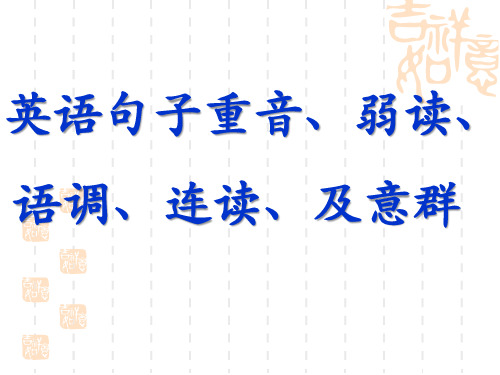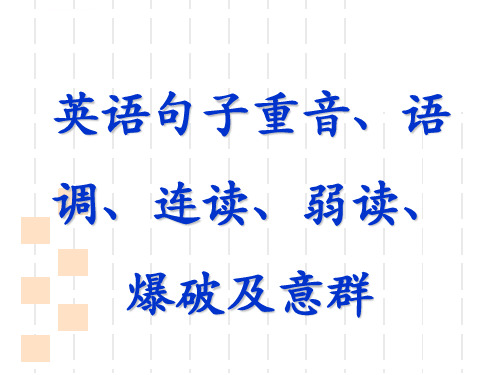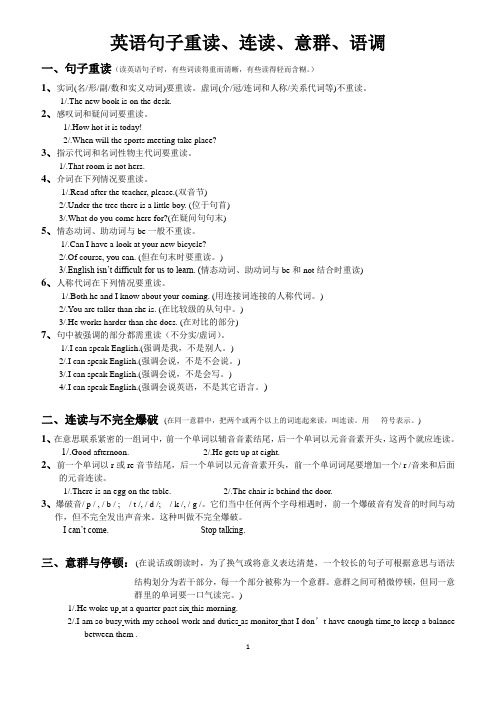第五讲-意群、句子重音和语调
英语句子重音、语调、连读、弱读、爆破及意群 教学PPT

• He ‘isn’t a tech ‘nician.
• 3. be用在一般疑问句句首时,重读与否均可: • ‘Is he a ‘worker? • Is he a ‘worker?
• 比较句中的重音 • 在比较句中,重音落在as或than后的代(名)词上: • This is better than ‘that. • John is taller than ‘Bill. • She’s as happy as a ‘lark. • He’s as sly as a ‘fox.
• You were trying, ‘weren’t you? Yes, I ‘was.
• 2. 助动词、情态动词和be动词与not连成一词时要重读:
• She ‘doesn’t ‘like the ‘weather here.
• I ‘can’t ‘speak ‘French。
• They ‘aren’t ‘waiting for us.
Note
如果前词尾辅音与后词尾辅音相同,前辅
音省略。
I was× so happy. I have got× to go. →I have gotta go.(to轻音化为ta) Do~you want× to dance? →do you wanna dance?
(to轻音化为na)
Note
以辅音结尾的单词 + h开头的单词,h不发
in an hour pick it up an hour and a half let him in
A group of people put on their coats and went out.
2.“辅音+半元音”
i. 英语语音中的/j/和/w/是半元音,如果前一个词是 以辅音结尾,后一个词是以半元音,特别是/j/开头, 此时也要连读。
句子重读、连读、意群、语调

重读、连读、意群、语调
英语句子重读、连读、意群、语调
一、句子重读(读英语句子时,有些词读得重而清晰,有些读得轻而含糊。)
1、实词(名/形/副/数和实义动词)要重读。虚词(介/冠/连词和人称/关系代词等)不重读。
1/.The new book is on the desk.
2、感叹词和疑问词要重读。 1/.How hot it is today!
2/.I am so busy with my school-work and duties as monitor that I don’t have enough time to keep a balance between them .
四、语调 1、升调的使用 1/.Are you waiting for someone?↗ (一般疑问句)
I canቤተ መጻሕፍቲ ባይዱt come.
Stop talking.
三、意群与停顿:(在说话或朗读时,为了换气或将意义表达清楚,一个较长的句子可根据意思与语法结构划分为 若干部分,每一个部分被称为一个意群。意群之间可稍微停顿,但同一意群里的单词要一口 气读完。) 1/.He woke up at a quarter past six this morning.
2/.One,↗ two,↗ three,↗ four,↗ five.↘ (数数) 3/.We bought some sugar,↗ some vegetables↗ and two bottles of beer.↘ (列举事务) 2、降调的使用 1/.What do you plan to do this weekend?↘ (特殊疑问句) 2/.The train started out two minutes ago.↘ (陈述句) 3/.Please ask him to come in.↘ (祈使句) 4/.What a fine day!↘ (感叹句) 3、特殊类 1/.Are you a Chinese ↗ or a Japanese?↘ (选择疑问句,前升后降。)
英语句子重音、弱读、语调、连读、及意群

▪ 用于陈述句
降调
▪ I have already read that book. ↘
▪ That street is two miles long. ↘
▪ 用于特殊疑问句 ▪ What has happened to him? ↘ ▪ Which direction is it to the post office? ↘ ▪ 注意:特殊疑问句有时可用升调表示请别人重复刚说过的话: ▪ What is your major? ↗ ▪ Where shall we go for the holiday? ↗
不可连读的情况
当短语或从句之间按意群进行停顿时,意群与意 群之间即使有两个相邻的辅音与元音出现,也不 可连读。
▪ 9) you /jə/ ▪ What do you think?
▪ 10) your /jə/ ▪ Take your time.
▪ 11) us /əs/ ▪ Let us think it over.
▪ 12) that /ðət/ ▪ This is the house that Jack built.
maybe even good enough to come up with the next
iPhone
keeps us from turning a blind eye to corruption and to
injustice
2.“辅音+辅音”
爆破音/p/,/b/,/t/,/d/,/k/,/g/ 和摩擦音/f/,/v/,/W/, 其中任意2个相临时,前一个音会轻音化,即由相关的发音器官 做好这个发音的姿势,稍做停顿后即发后面的音。 如果这些音 在词尾,也要轻音化。
job.
人教版初中英语七年级上册英语意群、重读、弱读、连读、爆破和语调-课件

Note
如果前词尾辅音与后词尾辅音相同,前辅
音省略。
I was× so happy. I have got× to go. →I have gotta go.(to轻音化为ta) Do~you want× to dance? →do you wanna dance?
(to轻音化为na)
Note
以辅音结尾的单词 + h开头的单词,h不发
助动词、情态动词和be动词是否有句子重音?
▪ 1. 助动词、情态动词和be动词一般没有句子重音,但在附加 句中可以重读,在简答句中则必须重读:
▪ He won’t do it, ‘will he? No he ‘won’t. ▪ You can do it, ‘can’t you? Yes, I ‘can. ▪ You were trying, ‘weren’t you? Yes, I ‘was. ▪ 2. 助动词、情态动词和be动词与not连成一词时要重读: ▪ She ‘doesn’t ‘like the ‘weather here. ▪ I ‘can’t ‘speak ‘French。 ▪ They ‘aren’t ‘waiting for us. ▪ He ‘isn’t a tech ‘nician.
逻辑重音
▪ 句子的重音总是要表现说话人的思想和他 所要表达的意思的重点。有时为了强调, 句子中几乎任何词都可以有句子重音,包 括一些通常没有句子重音的词,这种依说 话者意图重读的音就是逻辑重音。
▪ Are you ‘angry with me? ▪ Are you ‘angry with ‘me? ▪ Are ‘you ‘angry with me?
▪ 用于选择疑问句中“or”之后的部分 ▪ Do you want to ride or walk? ↘ ▪ Would you like coffee or tea? ↘
英语意群重读弱读连读爆破和语调ppt课件

英语句子重音、语 调、连读、弱读、
爆破及意群
从使用情况来看,闭胸式的使用比较 广泛。 敞开式 盾构之 中有挤 压式盾 构、全 部敞开 式盾构 ,但在 近些年 的城市 地下工 程施工 中已很 少使用 ,在此 不再说 明。
▪ Did you tell my ‘wife? ▪ Did you tell ‘my wife? ▪ Did ‘you tell my wife?
▪ We ‘heard ‘John ‘talking. ▪ We ‘heard John talking. ▪ We heard ‘John talking.
▪ 用于置于句首的状语短语或状语从句 ▪ After dinner ↗, I read a magazine and made telephone
calls. ↘ ▪ While you were writing letters ↗, I was reading a book. ↘ ▪ 用于并列句的第一个分句,表示句子还未说完 ▪ My fever is gone ↗, but I still have a cough. ↘ ▪ My major is English ↗, and I like it. ↘ ▪ 用于委婉祈使句 ▪ Excuse me, sir ↗. Can you help me? ↗ ▪ 用于称呼语 ▪ Mrs. Smith ↗, this is Tom Jones. ↘
从使用情况来看,闭胸式的使用比较 广泛。 敞开式 盾构之 中有挤 压式盾 构、全 部敞开 式盾构 ,但在 近些年 的城市 地下工 程施工 中已很 with me?
英语意群、重读、弱读、连读、爆破和语调备课讲稿

Note
▪ 名词、实义动词、形容词、副词、数 词、指示代词、疑问词和感叹词等一 般都重读。
▪ 而冠词、介词、连词和一般性的代词 则不重读。
▪ ‘What ‘s the ‘matter? ▪ The ‘sweater is ‘beautiful. ▪ Your ‘book is on the ‘desk. ▪ He ‘started ‘counting it. ▪ He ‘usually ‘gets up at ‘six o’clock.
耐烦的口气,或表示命令等。 ▪ Are you satisfied? ↘ ▪ Will you take off your hat, please? ↘
▪ 用于罗列中最后一项之前的各项 ▪ For each incomplete sentence, there are four
choices marked A↗, B↗, C↗, and D. ↘ ▪ We study Chinese ↗, history ↗, geography ↗,
▪ That street is two milhat has happened to him? ↘ ▪ Which direction is it to the post office? ↘ ▪ 注意:特殊疑问句有时可用升调表示请别人重复刚说过的话: ▪ What is your major? ↗ ▪ Where shall we go for the holiday? ↗
助动词、情态动词和be动词是否有句子重音?
▪ 1. 助动词、情态动词和be动词一般没有句子重音,但在附加 句中可以重读,在简答句中则必须重读:
▪ He won’t do it, ‘will he? No he ‘won’t. ▪ You can do it, ‘can’t you? Yes, I ‘can. ▪ You were trying, ‘weren’t you? Yes, I ‘was. ▪ 2. 助动词、情态动词和be动词与not连成一词时要重读: ▪ She ‘doesn’t ‘like the ‘weather here. ▪ I ‘can’t ‘speak ‘French。 ▪ They ‘aren’t ‘waiting for us. ▪ He ‘isn’t a tech ‘nician.
人教版初中英语八年级上册英语意群、重读、弱读、连读、爆破和语调-课件

▪ That street is two miles long. ↘
▪ 用于特殊疑问句 ▪ What has happened to him? ↘ ▪ Which direction is it to the post office? ↘ ▪ 注意:特殊疑问句有时可用升调表示请别人重复刚说过的话: ▪ What is your major? ↗ ▪ Where shall we go for the holiday? ↗
▪ 用于选择疑问句中“or”之后的部分 ▪ Do you want to ride or walk? ↘ ▪ Would you like coffee or tea? ↘
升调
▪ 用于一般疑问句 ▪ Do you mind if I sit here? ↗ ▪ Can you hand in your compositions today? ↗ ▪ 注意:一般疑问句有时也可用降调,表示一种不
助动词、情态动词和be动词是否有句子重音?
▪ 1. 助动词、情态动词和be动词一般没有句子重音,但在附加 句中可以重读,在简答句中则必须重读:
▪ He won’t do it, ‘will he? No he ‘won’t. ▪ You can do it, ‘can’t you? Yes, I ‘can. ▪ You were trying, ‘weren’t you? Yes, I ‘was. ▪ 2. 助动词、情态动词和be动词与not连成一词时要重读: ▪ She ‘doesn’t ‘like the ‘weather here. ▪ I ‘can’t ‘speak ‘French。 ▪ They ‘aren’t ‘waiting for us. ▪ He ‘isn’t a tech ‘nician.
英语句子重读、连读、意群、语调

英语句子重读、连读、意群、语调一、句子重读(读英语句子时,有些词读得重而清晰,有些读得轻而含糊。
)1、实词(名/形/副/数和实义动词)要重读。
虚词(介/冠/连词和人称/关系代词等)不重读。
1/.The new book is on the desk.2、感叹词和疑问词要重读。
1/.How hot it is today!2/.When will the sports meeting take place?3、指示代词和名词性物主代词要重读。
1/.That room is not hers.4、介词在下列情况要重读。
1/.Read after the teacher, please.(双音节)2/.Under the tree there is a little boy. (位于句首)3/.What do you come here for?(在疑问句句末)5、情态动词、助动词与be一般不重读。
1/.Can I have a look at your new bicycle?2/.Of course, you can. (但在句末时要重读。
)3/.English isn’t difficult for us to learn. (情态动词、助动词与be和not结合时重读)6、人称代词在下列情况要重读。
1/.Both he and I know about your coming. (用连接词连接的人称代词。
)2/.You are taller than she is. (在比较级的从句中。
)3/.He works harder than she does. (在对比的部分)7、句中被强调的部分都需重读(不分实/虚词)。
1/.I can speak English.(强调是我,不是别人。
)2/.I can speak English.(强调会说,不是不会说。
)3/.I can speak English.(强调会说,不是会写。
